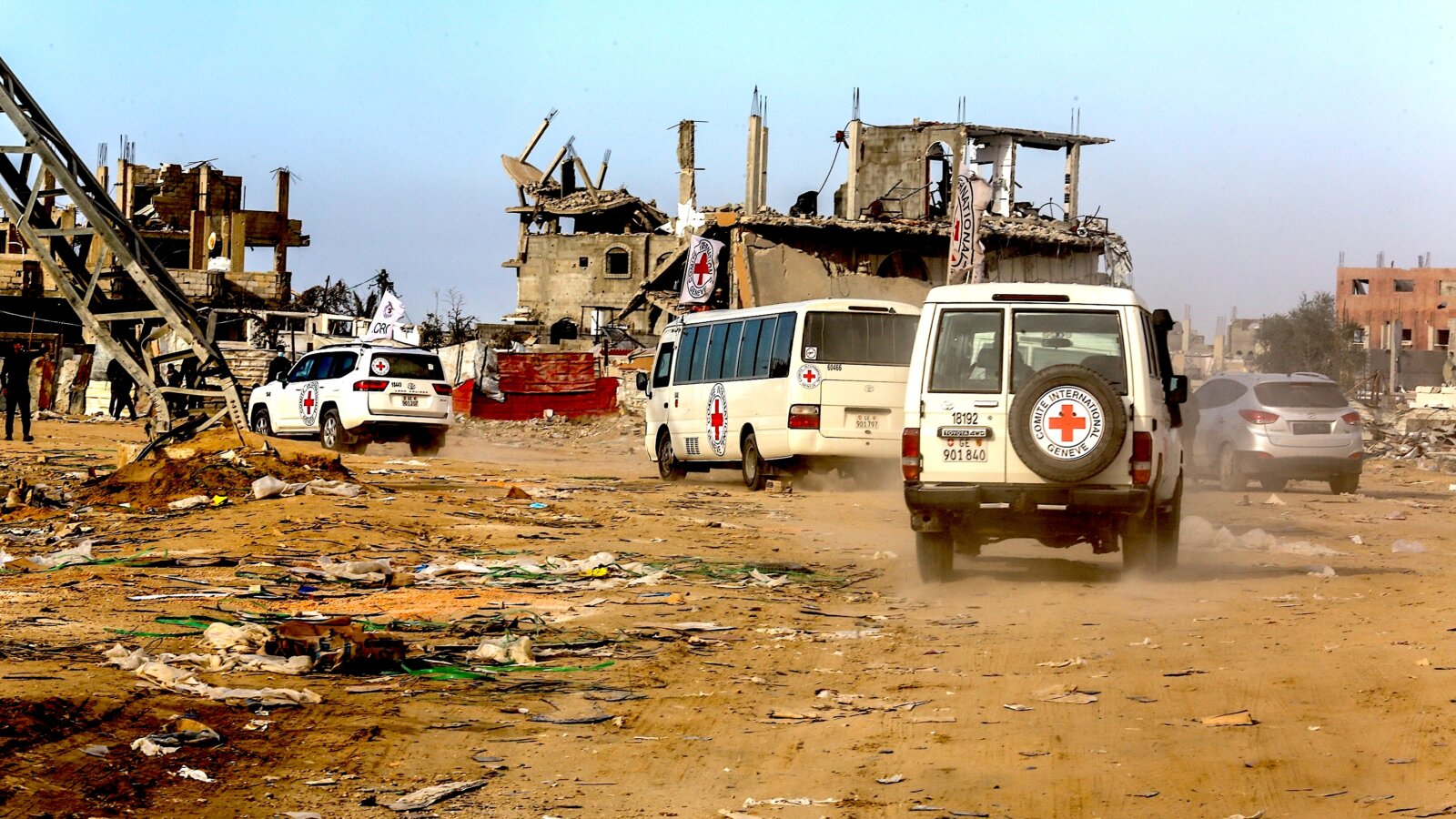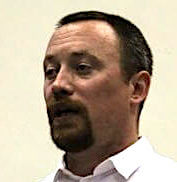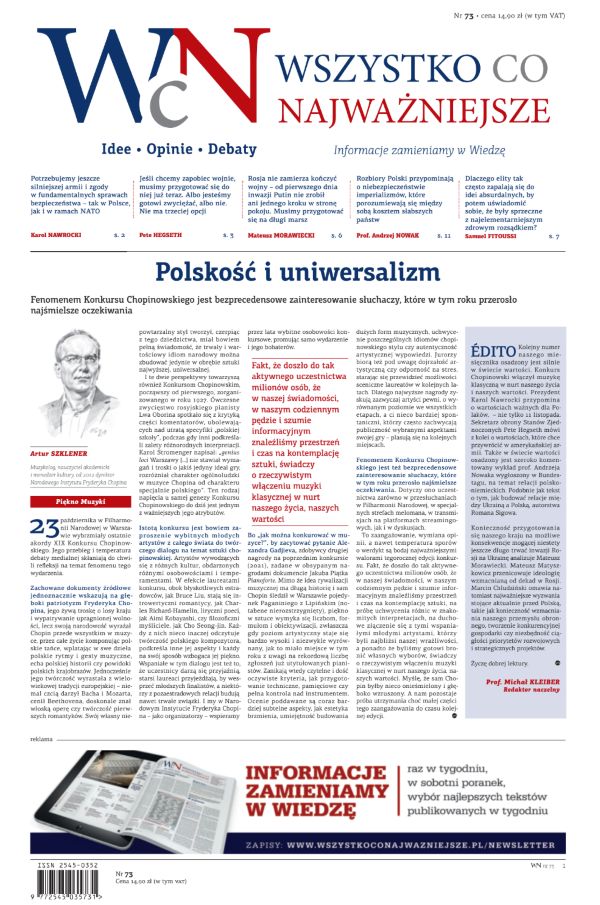
 Humanitarian Law Is No Longer Taken for Granted
Humanitarian Law Is No Longer Taken for Granted
At the 80th UN General Assembly in New York, Tommaso della Longa, spokesperson of the International Federation of Red Cross and Red Crescent Societies, delivers a stark warning: humanitarian workers are being killed at unprecedented levels, international law is no longer respected, and neutrality is increasingly under attack. Yet, he insists, hope must remain at the core of humanitarian action.
Michał KŁOSOWSKI: At this 80. UN General Assembly you are putting forward a very strong message. What exactly are you telling world leaders here?
Tommaso della LONGA (spokesperson of the International Federation of Red Cross and Red Crescent Societies): We came here with a crystal-clear message. We are engaging with delegations and leaders to highlight the tragic toll of our colleagues who have been killed on the frontline while serving others.
Michał KŁOSOWSKI: The world has not been used to witnessing Red Cross workers being killed on a daily basis…
Tommaso della LONGA: Exactly. We have entered a shocking situation. Rules that we used to take for granted since World War II – or even before – no longer seem to hold. For decades it was understood: you do not shoot at the Red Cross, you do not attack humanitarian workers. Our mission was, and still is, to enable access and to help those in need. But this principle is no longer respected. The year 2024 has been the deadliest on record for humanitarian workers. Out of the hundreds who lost their lives, 32 were members of the IFRC network – our Red Cross and Red Crescent national societies. The vast majority were killed in Gaza and Sudan, but we also lost Magen David Adom volunteers in Israel on October 7, as well as colleagues in the Democratic Republic of Congo, in Ethiopia, and in other parts of the world.
And sadly, the outlook for 2025 does not look any better.
Michał KŁOSOWSKI: Why is this happening?
Tommaso della LONGA: Already this year we have lost 17 members of our network. Eight of them were killed in a truly horrific event in Gaza. We lost contact with them for days, and when they were finally found, it was too late. They were killed while doing their work, while driving ambulances, wearing the Red Cross emblem, protected under international law. That is why our message today is about going back to basics – to International Humanitarian Law, but also to the very principle of humanitarianism itself. Respect humanitarian workers. Protect humanitarian workers. Let us do our job. And here in New York, just last Sunday, something important happened. Together with more than a hundred other countries, we joined the Australia-led declaration on the protection of humanitarian personnel. For us, this is a very significant step.
Michał KŁOSOWSKI: But the world has mostly remained silent on this, hasn’t it?
Tommaso della LONGA: Over a hundred countries signed the declaration. The IFRC will host the secretariat of the “Friends of the Declaration” for at least the next two years. What matters is not only the recognition of humanitarian law, but also accountability. There must be mechanisms to bring to justice those who violate these rules. This is why we will continue to monitor the situation and use this declaration as a tool to push governments worldwide to take their responsibilities seriously. Because in the end, humanitarian workers can only do their job if the parties in conflict – and the governments – allow us to.
Michał KŁOSOWSKI: We have spoken about Gaza and Africa. But talking here in New York, Poland naturally raises the question of Ukraine. How is the Red Cross working there?
Tommaso della LONGA: Ukraine has been an enormous challenge from the very beginning of the conflict. Recently, our colleagues from the Ukrainian Red Cross were wounded in an attack. Thankfully, no one was killed, but it was another stark reminder of the risks they face every day.
We are fortunate, however, that the Ukrainian Red Cross is strong, talented, and deeply rooted in their own communities. This allows them to carry out a wide range of activities: from first aid, to distributing food and essential items, to one of their key priorities – mental health support. They also assist local and national authorities whenever emergencies strike. And this is the added value of the Red Cross and Red Crescent worldwide: our volunteers are part of their local communities. They live there, they are trained there, and they are the very first to respond. But this also means they are directly affected – under bombardments, earthquakes, or other disasters, they suffer alongside their neighbors. That is why we always say: yes, we are an international organization, but at our heart we are champions of localization. Local actors must be in the driver’s seat of the response. That’s how it works in Ukraine, and that’s how it works around the world.
Sadly, 2024 was the first year in history when humanitarian workers were deliberately targeted and killed at this scale. Our world is becoming more polarized, more radicalized – and this is something we cannot ignore.
Michał KŁOSOWSKI: I need to ask how do you manage to stay neutral in such a complex world, where all sides may try to use humanitarian aid for their own goals?
Tommaso della LONGA: That question is exactly what keeps us awake at night. Neutrality is not just a principle for us—it is the cornerstone of everything we do. From the community level to the international level, it has become more critical than ever. Of course, our first principle is humanity. But alongside humanity, independence, impartiality—and above all neutrality—are essential. Neutrality means that we do not take sides in a conflict. But neutrality does not mean silence. It does not mean we cannot call out abuses or stand with people in need. The challenge today is that neutrality is often misunderstood. If we don’t explicitly blame one side, people immediately assume we support the other. This is extremely complicated. But neutrality is the only way to secure what matters most: access. If I must choose between holding a press conference denouncing a party and being able to reach civilians with aid the next morning, I will always choose access. That is the reality of humanitarian work today. And there is something else: for years, international humanitarian law and the principles of humanitarian action were taken for granted. Today, they no longer are. That is why we are here at the United Nations—because more than ever we need to bring humanity back into every debate. Too often discussions are about numbers, about military or political strategies. But every number represents people, families, lives. Keeping people at the center will always be our mission.
Michał KŁOSOWSKI: This year marks 80 years since the creation of the United Nations. We are in the very heart of an institution built on the idea of bringing people together and helping them. Do you still have hope, when the world looks so divided?
Tommaso della LONGA: Hope must always be there. As a humanitarian, I cannot afford to lose hope—otherwise I should change my job. Every single day, whether in Gaza, Sudan, or Ukraine, we think we have reached the worst possible point, and then the next day something even worse happens. It is, frankly, unbelievable. But we cannot lose hope. We are a lean secretariat, but we represent 17 million volunteers around the world. Our colleagues on the frontlines—in Ukraine, fighting Ebola in the Democratic Republic of Congo, or driving ambulances in Gaza—deserve that we keep hope alive, and that we represent them in forums like this.
At the same time, I am not naïve. Words are not enough. Declarations must lead to action. The recent declaration on the protection of humanitarian personnel was a bold step by many governments. Our hope is that it will now translate into real protection in the field—for our people, for the humanitarians risking their lives every day.
Michał KŁOSOWSKI: The world is changing before our very eyes. Technology is increasingly making decisions that affect people’s lives. For example, the Israeli army has admitted to using artificial intelligence in targeting operations in Gaza. But I would like to reverse the question: how can new technologies be used for good, to help people rather than destroy them?
Tommaso della LONGA: You are asking the right question. It is perhaps the question for the entire humanitarian sector today. Technology itself is not the problem—the real challenge lies in the ethics of how it is used.
If you think back just 15 years, social media barely existed, and access to information was limited. The world has since changed dramatically. Technology has brought enormous benefits: the ability to share knowledge instantly, to reach people quickly, to mobilize communities. But we also see the dark side—misinformation, disinformation, harmful content.
That’s why I always say: it is not the tool itself, but how the tool is used. Artificial intelligence, for example, can help us save lives. We already use technology for forecast-based interventions, anticipatory action, and early-warning systems. These innovations literally save lives by allowing us to prepare for disasters before they happen.But there must be red lines. For the Red Cross and Red Crescent, these are ethics, data protection, and privacy. And above all, international law still applies, no matter what technology is used. Civilians must always be protected. If AI—or any tool—is used to bypass or violate humanitarian law, then it is unacceptable. Of course, I don’t want to sound naïve. We know the risks. Look at how bots on social media are weaponized to manipulate opinions. We ourselves have been victims of harmful misinformation campaigns. That is why one of our priorities right now is building a global network across our 191 national societies to detect and counter harmful information, and to stay one step ahead instead of always reacting after the damage is done. There is no magic solution. But I truly believe that when used responsibly, technology can mean the difference between life and death for millions of people.
Michał KŁOSOWSKI: You’ve said we cannot lose hope. But looking ahead, from now until the next General Assembly, what do you predict for the humanitarian sector?
Tommaso della LONGA: Sadly, the trend is worrying. We see more and more governments shifting priorities from humanitarian aid to defense spending. In some parts of the world, our national Red Cross and Red Crescent societies are the only organizations left in communities.
The humanitarian needs are growing, but the budgets are shrinking. We are targeted more than ever before, yet we cannot lose hope and we cannot stop. That means we will need to be even more present, more responsive, and more bold in pressing governments to act.
One of our biggest priorities is ensuring that funding reaches local communities, not just global structures. For us, localization is not a slogan. We have been advocating it long before the World Humanitarian Summit. We are a network of 191 societies, and we believe that local actors must be in the driver’s seat. Our goal is to bring directly to the local level 75% of our funds—and we hope the rest of the humanitarian world will follow.
Michał KŁOSOWSKI: So you are often a step ahead of others. What are your concrete plans for the coming year?
Tommaso della LONGA: We know there are critical hotspots—Ukraine, Gaza, Sudan—where we cannot retreat, no matter how difficult the circumstances. Our mission is to uphold humanitarian principles, even when the world seems to be turning away from them.
.At the same time, we must think long term. Conflicts may end, but vulnerability remains for years. That is why our focus is on strengthening local resilience. Too often, the international community looks only at needs, but we also look at capacities. And at the local level, those capacities are often extraordinary. Our task is to enable them—to provide the support, resources, and tools so that local communities can take the lead in responding to crises. That is our commitment for the weeks and months ahead: to remain present, to stay close to the people we serve, and to ensure that humanitarian action is as local as possible—because in the end, local actors are always the first to respond, and often the last to leave.
Tommaso della Longa






